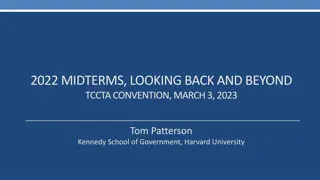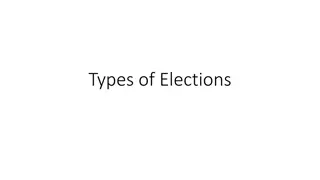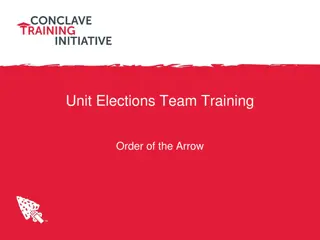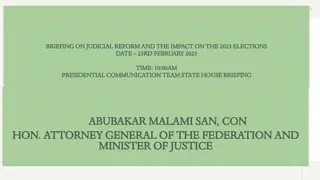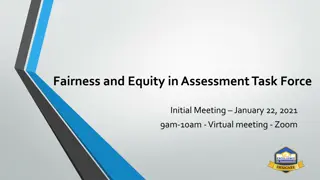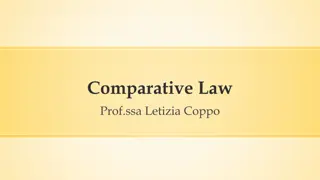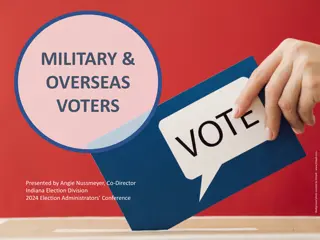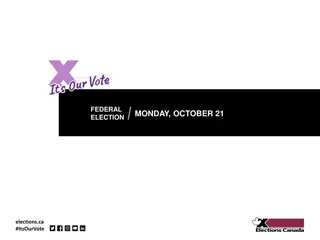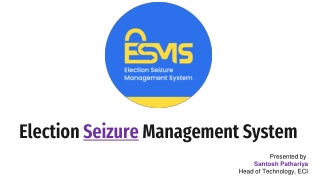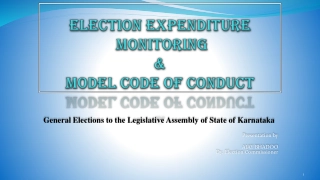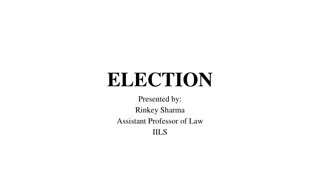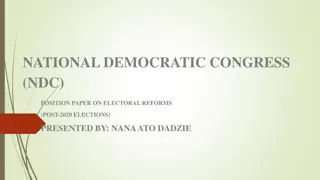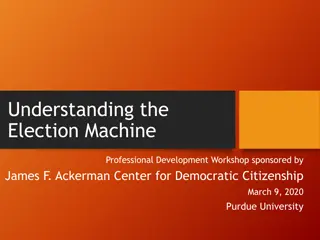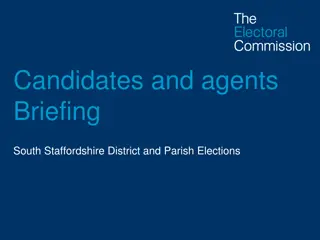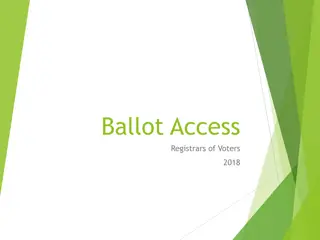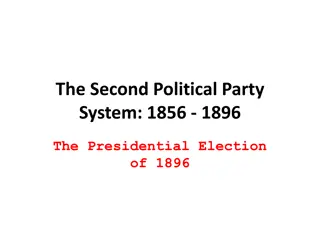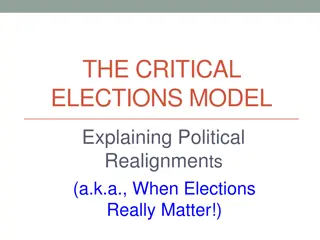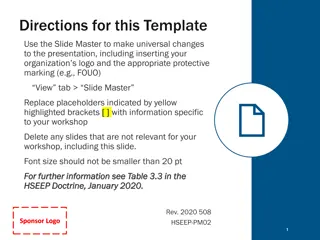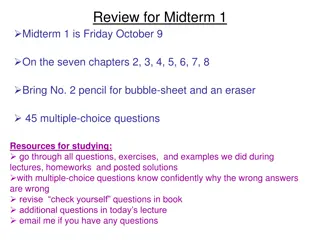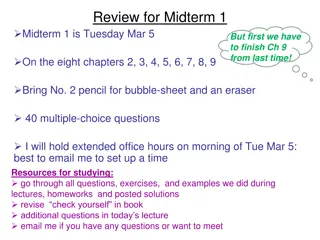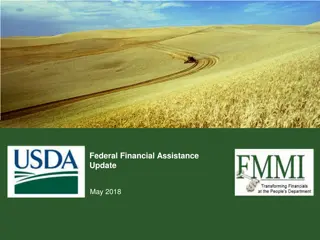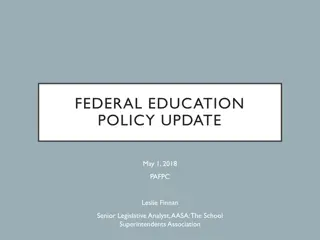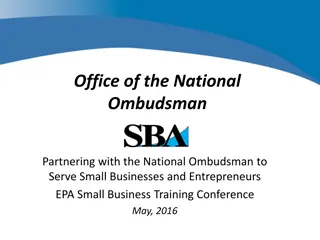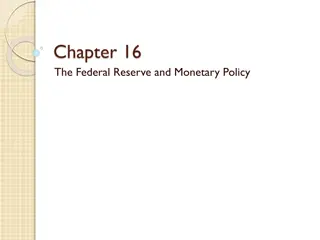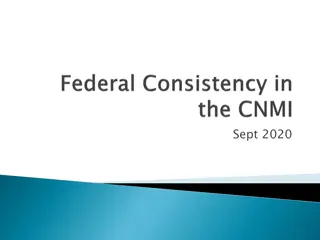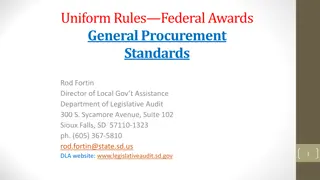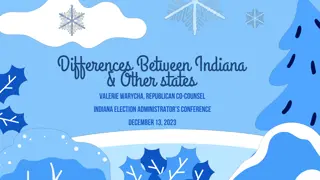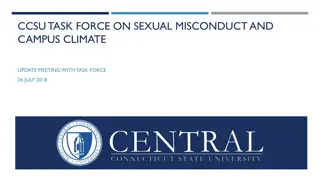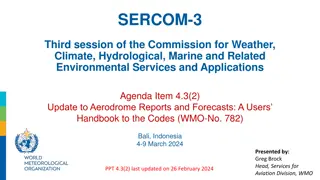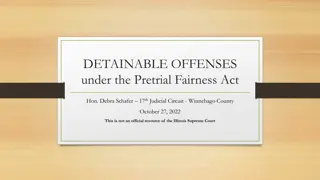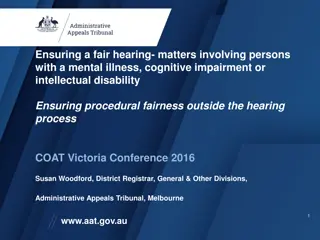Update on E-Fairness Federal Initiatives & 2018 Midterm Elections
The Supreme Court decision in South Dakota v. Wayfair has paved the way for states to require out-of-state sellers to collect and remit sales tax. Various federal legislative bills have been introduced in the 115th Congress regarding e-fairness. The Marketplace Fairness Act, S.976, aimed to establish a destination sourcing model for remote sales tax collection and provide small business exemptions. The focus is on state implementation and demonstration of fair and transparent tax collection processes. Congress continues to show interest in e-fairness despite the SCOTUS decision.
Uploaded on Sep 12, 2024 | 0 Views
Download Presentation

Please find below an Image/Link to download the presentation.
The content on the website is provided AS IS for your information and personal use only. It may not be sold, licensed, or shared on other websites without obtaining consent from the author. Download presentation by click this link. If you encounter any issues during the download, it is possible that the publisher has removed the file from their server.
E N D
Presentation Transcript
E-Fairness Federal Initiatives & 2018 Midterm Elections Update Prepared for Streamlined Sales Tax Governing Board (SST) October 3, 2018
South Dakota v. Wayfair SCOTUS Decision 3 On June 21, 2018, the U.S. Supreme Court ruled in South Dakota v. Wayfair that states can require out-of-state sellers to collect and remit sales tax for transactions made into the state, regardless of any physical presence. If a state chooses to ignore the simplifications, small seller thresholds and no retroactive application features of the South Dakota law in crafting their own laws, there may be more litigation, and a higher potential for action by Congress. States began implementing sales tax collection laws as early as July 1, 2019 Will Congress act this year and pass a federal bill? SST is not advocating for federal e-fairness legislation at this time. Let the states demonstrate that they can and will implement this fairly and in a transparent manner.
E-fairness Action in the 115th Congress 5 SST participated in 121 meetings with House and Senate members and staff in the 115th Congress (2017-2018). 22 meetings with House and Senate policymakers September 11-12, 2018. SST advised House and Senate stakeholders about SCOTUS amicus brief submissions. Provided feedback about the SSUTA and participating states activities. Tracked e-fairness critics comments and briefs and shared with interested parties. Multiple federal legislative bills have been introduced during the 115th Congress. 4 House bills (2 pre-SCOTUS decision, 2 post-SCOTUS decision) 2 Senate bills (1 pre-SCOTUS decision, 1 post-SCOTUS decision) Committee hearings held, but no legislative action taken. House Judiciary Subcommittee on Regulatory Reform, Commercial, and Antitrust Law July 25, 2017 House Judiciary Committee July 24, 2018 Wayfair v. South Dakota SCOTUS decision has not stopped congressional interest in e-fairness.
Pre-SCOTUS Decision: E-fairness Legislative Action 6 Advocated for the passage of federal legislation that allows for remote sales tax collection. Worked directly with all interested stakeholders to achieve the ability to collect sales taxes on remote sales.
Pre-SCOTUS Decision: E-fairness Legislative Action 7 S. 976, The Marketplace Fairness Act Introduced: April 27, 2017 Sponsor: Michael B. Enzi (R-WY) Cosponsors: 27 cosponsors 19 Democrats, 7 Republicans, and 1 Independent Committee: Senate Finance Committee SST Position: Support Key aspects of the bill: Destination sourcing model for remote sales tax collection Small business exemption - $1million on remote sales Audit procedures Software costs and integration liability
Pre-SCOTUS Decision: E-fairness Legislative Action 8 H.R. 2193, The Remote Transactions Parity Act Introduced: April 27, 2017 Sponsor: Kristi Noem (R-SD) Cosponsors: 26 Democrats and 24 Republicans Committee: House Judiciary Committee SST Position: Support Key aspects of the bill: Destination sourcing model for remote sales tax collection Small business exemption 3-year phase down with zero sunset Audit procedures Software costs and integration liability
Pre-SCOTUS Decision: E-fairness Legislative Action 9 H.R. 2287, No Regulation Without Representation Act of 2017 Introduced: June 12, 2017 Sponsor: Jim Sensenbrenner (R-WI) Cosponsors: 11 Cosponsors 10 Republicans and 1 Democrat Committee: House Judiciary Committee SST Position: Oppose Key aspects of the bill: Codifies the physical presence requirement established by the U.S. Supreme Court in the 1992 Quill decision. Prohibits a state from taxing or regulating a person's activity in interstate commerce unless the person is physically present in the state during the period in which the tax or regulation is imposed.
Post-SCOTUS Decision: E-fairness Legislative Action 10 SST is not advocating for federal e-fairness legislation at this time. Let the states demonstrate that they can and will implement this fairly and in a transparent manner. Critics concerns after the announcement of the South Dakota v. Wayfair SCOTUS decision: Retroactivity Small seller exemption levels Implementation dates by the states Creating and implementing new state compacts to streamline sales and use tax systems State overreach
Post-SCOTUS Decision: E-fairness Legislative Action 11 S. 3180, The Stop Taxing Our Potential (STOP) Act Introduced June 28, 2018 Sponsor: Jon Tester (D-MT) Cosponsors: 3 Democrats (Senators Jeanne Shaheen (D-NH), Jeff Merkley (D-OR), and Maggie Hassan (D-NH)) Committee: Senate Finance Committee SST Position: Oppose Key aspects of the bill: Imposes a strict physical nexus standard Overturn the U.S. Supreme Court s decision (Wayfair v. South Dakota).
Post-SCOTUS Decision: E-fairness Legislative Action 12 H.R. 6724, Protecting Businesses from Burdensome Compliance Cost Act of 2018 Introduced: September 6, 2018 Sponsor: Rep. Bob Gibbs (R-OH) Cosponsors: 2 Republicans (Reps. Joe Wilson (R-SC) and Diane Black (R-TN)) Committee: House Judiciary Committee SST Position: Oppose Key aspects of the bill: Limit the authority of a state to require remote sellers to collect taxes and fees owed by purchasers Single rate per state Single point of collection per state
Post-SCOTUS Decision: E-fairness Legislative Action 13 H.R. 6824, The Online Sales Simplicity and Small Business Relief Act Introduced: September 13, 2018 Sponsor: Jim Sensenbrenner (R-WI) Cosponsors: 2 Democrats (Reps. Anna Eshoo (D-CA) and Zoe Lofgren (D- CA) and 2 Republicans (Reps. Jim Banks (R-IN) and Jeff Duncan (R-CA)) Committee: House Judiciary Committee SST Position: Oppose Key aspects of the bill: Prevent retroactive collection (prior to June 21, 2018) Delay collection until after January 1, 2019) Sets a small business exemption of $10 million that will be eliminated upon congressional approval of a state compact on simplification Relies on an physical presence concept struck down by the Supreme Court in South Dakota v. Wayfair
2018 Midterm Elections 15 President Trump is not on the ballot but his policies and his popularity loom large Presidential approval rating historically impacts the fate of his party in midterms Senate Republican challengers hoping to beat Democrats who are running in states that President Trump won handily House Republicans are girding for tough battles in November
115th Congress (2017-2018) Makeup Senate 17 100 Senators 51 Republicans 49 Democrats (47 + 2 Independents)
Three Rotating Senate Classes 18 Class I (33) Class II (33) Class III (34) Term Expires January 2021 Term Expires January 2023 Term Expires January 2019 12 Democrats 12 Democrats 23 Democrats 21 Republicans 22 Republicans 2 Independents 8 Republicans Note: 6-year terms for all U.S. Senators
Competitive Senate Seats 2018 19 Democrats (7) Republicans (4) FL - Nelson IN - Donnelly MO - McCaskill MN - Smith ND - Heitkamp MT - Jon Tester WV - Manchin AZ - Open (Flake) NV - Heller TN - Open (Corker) TX - Cruz Source: Cook Political Report
2018 Senate Map 20 * Sen. Tina Smith (D-MN) and Sen. Cindy Hyde-Smith (R-MS) are running in special elections to finish out their terms
Senate Outlook 2018 21 Many new Senators With no seats flipping, just allowing for retirements there will be at least 4 -5 new Senators If Republicans win all competitive seats and lose none, the ratio will be 58-42 Still short of the 60 votes necessary to pass legislation All moderates would be gone If Democrats win all competitive seats and lose none, control of the chamber will flip, but still the ratio will be a very slim 52 Democrats 48 Republicans New chairmen, committee members VP breaks a 50-50 tie
115th Congress (2017-2018) Makeup House 23 435 Representatives 236 Republicans 193 Democrats 6 Vacancies
115thHouse of Representatives 24 435 total Members 236 Republicans 193 Democrats (6 vacancies 4 Rs 2 Ds) ~ 43 seat majority Run for reelection every 2 years Can be dependent on national trends, more so than Senators More than 50 new Members in this Congress 12% of the House 70% of House Republicans had never served under a Republican President There are about three dozen Members of the House Freedom Caucus Their votes as a block are incredibly impactful House Democrats need a net pickup of 23 seats for control
Competitive House Seats 2018 25 Democrats (3) Republicans (42) Concentrated in CA, IL, NJ, NY, PA 2 in MN, 1 in PA Source: Cook Political Report
Key House Races in Six States (39) 26 5 Competitive Seats: MI-8 MI-11 MI-1 MI-6 MI-7 10 Competitive Seats: CA-7 CA-49 CA-10 CA-25 CA-39 CA-48 CA-45 CA-4 CA-21 CA-50 6 Competitive Seats: NY-19 NY-22 NY-11 NY-1 NY-24 NY-27 9 Competitive Seats: PA-5 PA-6 PA-8 PA-7 PA-1 PA-17 PA-10 PA-14 PA-16 4 Competitive Seats: IL-6 IL-12 IL-14 IL-13 5 Competitive Seats: NJ-2 NJ-5 NJ-11 NJ-7 NJ-3
House Outlook 2018 27 Announced retirements indicate many new members coming Potential to see Republican losses of moderates, so Republican Conference could be more conservative Democratic pickups, if they occur, will be in moderate districts which will pull the caucus to the middle Leadership changes possible in both parties depending on election outcome
Congressional Turnover 29 Congressional turnover is expected to be high this year during midterm elections At present time, more than 50 House members are new to Congress this term number expected to grow Congressional candidates today are more likely to have never served in an elected office prior to running for Congress Will new members know about the SCOTUS decision and/or the SST s mission?
Senate Retirements and Resignations 30 Republicans (6 or ~12% of Senate GOP) 3 announced retirements (Senators Hatch, Corker, Flake) 3 resignations/lost special election after appointment (Senators Sessions, Cochran, Strange) 1death, however, seat was filled by appointment with a special election in 2020 (Senator McCain) Democrats (1 or 2% of Senate Dems) 1 resignation with seat filled by appointment (Senator Franken) In the last 8 years there has been between 12 17 % turnover each election Open seats more vulnerable than incumbents
SenateFinance Committee Current Ratio: 14-13 31 Republicans Orrin Hatch (UT), Chair (4 C, 4 RM) Chuck Grassley (IA) (4 C, 6 RM) Likely Chair under R control Mike Crapo (ID) Possible Chair/RM Pat Roberts (KS) Mike Enzi (WY) John Cornyn (TX) John Thune (SD) Richard Burr (NC) Johnny Isakson (GA) Rob Portman (OH) Pat Toomey (PA) Dean Heller (NV) Tim Scott (SC) Bill Cassidy (LA) Democrats Ron Wyden (OR), Ranking Debbie Stabenow (MI) Maria Cantwell (WA) Bill Nelson (FL) Bob Menendez (NJ) Tom Carper (DE) Ben Cardin (MD) Sherrod Brown (OH) Michael Bennet (CO) Bob Casey (PA) Mark Warner (VA) Claire McCaskill (MO) Sheldon Whitehouse (RI) Retiring Up for Re-election C = Years as Chair of Committee RM = Year as Ranking Member Committee seniority over sitting Chair/Ranking Member Senators in the running for open slots TBD
House Retirements and Resignations 32 Republicans (49 or 20% of House GOP) 36 announced retirements (13 are running for other office) 9 resignations with seat filled in special election 4 resignations leaving the seat vacant Democrats (21 or 11% of House Dems) 18 announced retirements (8 are running for other offices) 1 resignation with seat filled in special election 2 resignations/deaths leaving the seat vacant Combined at least 15% turnover already In the last 8 years, between 11-20% turnover each election Open seats harder to defend
House Judiciary Committee Current Ratio: 23-17 33 Republicans Bob Goodlatte (VA), Chair Jim Sensenbrenner (WI) Term-limited Lamar Smith (TX) Steve Chabot (OH) Possible Chair/RM Darrell Issa (CA) Steve King (IA) Possible Chair/RM Louie Gohmert (TX) Jim Jordan (OH) Ted Poe (TX) Tom Marino (PA) Trey Gowdy (SC) Ra l Labrador (ID) Doug Collins (GA) Possible Chair/RM Ken Buck (CO) John Ratcliffe (TX) Martha Roby (AL) Democrats Jerry Nadler (NY), Ranking Zoe Lofgren (CA) Sheila Jackson Lee (TX) Steve Cohen (TN) Hank Johnson (GA) Ted Deutch (FL) Luis Gutierrez (IL) Karen Bass (CA) Cedric Richmond (LA) Hakeem Jeffries (NY) David Cicilline (RI) Eric Swalwell (CA) Ted Lieu (CA) Jamie Raskin (MD) Pramila Jayapal (WA) Brad Schneider (IL) Val Demings (FL) new 2018 Martha Roby (AL) Matt Gaetz (FL) Mike Johnson (LA) Andy Biggs (AZ) John Rutherford (FL) Karen Handel (GA) Keith Rothfus (PA) Members vying for open slots TBD Strike Through: Lost in the primary, retiring, or running for other office
Outlook for Policy Initiatives 2019 34 Republicans retain control of both the House and Senate. Democrats gain majorities in both bodies. Democrats claim control of just the House. President Trump will be looking for wins headed into his own reelection bid. Impact on SST s advocacy efforts in Washington
2020 Election Cycle 35 President Trump on the ballot 33 Senators 21 Republicans; 12 Democrats 435 House members
Questions / Comments Randi Reid Kountoupes Denham Carr & Reid 607 14th Street, NW Suite 750 Washington, DC 20005 (202) 803-4585 randi@kdcrpartners.com www.kdcrpartners.com


